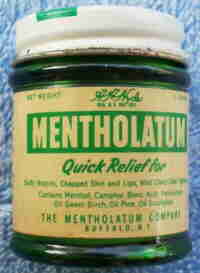| Mentholatum the cold remedy invented in a kitchen by
a former real estate mogul

Albert Alexander Hyde was born
in Lee, Massachusetts, on March 2, 1848. He moved
to Leavenworth, Kansas, with his brother in 1865
and became a clerk for the Clark & Company
Bank there. He was sent by the bank to open a new
branch in Wichita, Kansas, in 1872, and remained
with the bank until entering the booming real
estate market in 1887.
Hyde was able to amass a paper
fortune of over $100,000 in less than two years,
but the Wichita real estate market crash of 1889
left him deeply in debt. That same year he and
two associates put up $200 each and formed The
Yucca Company, which manufactured and marketed
perfumes, shaving creams, soaps, and other
products made from natural ingredients (mainly
yucca). Sales were too low to support three
families, however, and Hyde agreed to buy out his
partners later that same year.
One of Yucca's products was
Vest Pocket Cough Specific, a cough syrup made
from camphor and menthol that proved to also have
soothing and antiinflammatory effects. Hyde began
experimenting with the syrup's formula in hopes
of developing a salve that could relieve colds,
nasal congestion, and minor aches and pains.
Although his wife frequently complained about his
use of the family kitchen and cooking utensils
(many of which were ruined by his experiments),
Hyde remained persistent, and he introduced
Mentholatum ointment in December 1894; the name
was coined by combining the ointment's two
principal ingredients, menthol and petrolatum.
Mentholatum was an instant success, and in 1903
Hyde had to open a branch office in Buffalo, New
York, to handle marketing and distribution east
of the Mississippi River. Most of The Yucca
Company's original products were dropped over the
subsequent years, and it was officially renamed
and incorporated as The Mentholatum Compny in
1906. A new, larger factory was built in Wichita
in 1909, and a second factory was built in
Buffalo in 1919.
Mentholatum became a worldwide
product due to the generosity of Hyde, who was
known for only keeping 10% of his annual income,
donating the rest to worthy causes. A devout
Christian, Hyde donated thousands of jars of
Mentholatum to missionaries, who in turn
introduced its soothing properties to people
around the world. One of those missionaries was
William Merrell Vories, who acquired the rights
to sell Mentholatum products in Japan in 1913.
Mentholatum closed its Wichita
plant soon after Hyde's death (on January 10,
1935); its corporate offices were moved to
Wilmington, Delaware, in 1937, and to Buffalo in
1945. The company remained in the hands of the
Hyde family until 1988, when it was bought by the
Rohto Pharmaceutical Company of Japan, which had
originally been founded to manufacture
Mentholatum in Japan; the U.S. headquarters are,
however, still located in Buffalo.
Questions or comments about
this page?
|



